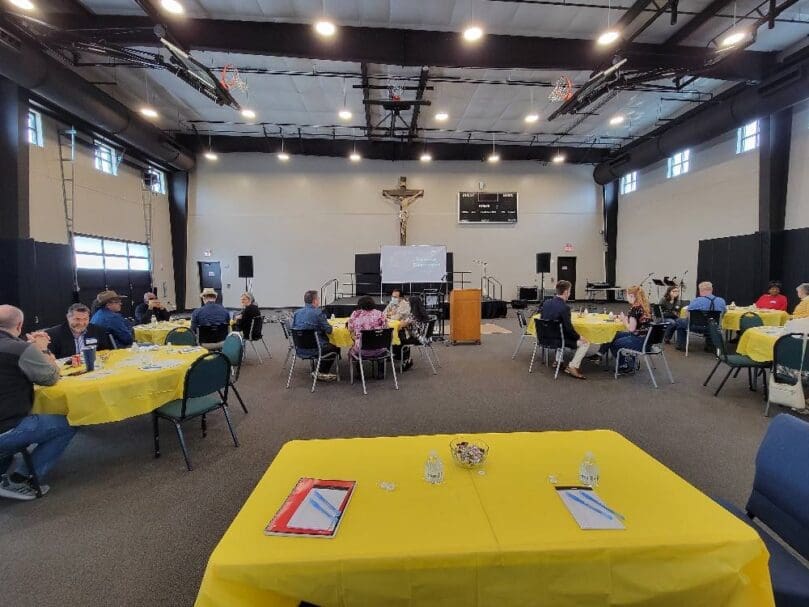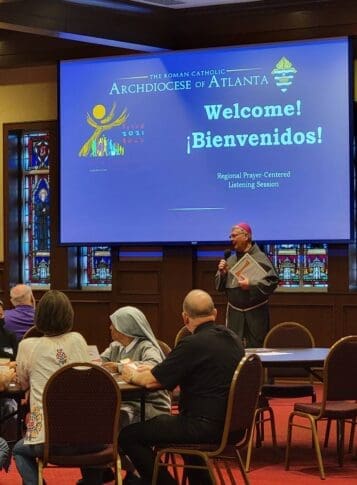
Douglasville
Synod listening sessions attracted hundreds to share joys and concerns
By ANDREW NELSON, Staff Writer | Published April 19, 2022
DOUGLASVILLE—Around a table of five were a retired court reporter and a woman who worked in the banking industry. The tablemates included a 17-year-old high school senior preparing for college and a 27-year-old who joined the church as an adult.
They spent some two hours prayerfully considering how the church “journeys together” as part of the Archdiocese of Atlanta’s regional listening sessions for the Synod on Synodality.
During the participants’ comments, Atlanta Archbishop Gregory J. Hartmayer, OFM Conv., wearing his Franciscan robe, sat in the back listening and taking notes.
Together, these faithful gathered at one table came to a consensus. They loved walking into any parish and feeling at home. But they were concerned how the customs of the faith don’t seem uniform. For instance, some parishes they believed discouraged receiving communion on the tongue. They hope to see a revival in eucharistic belief in the Real Presence from their fellow Catholics.
In the end, their experience together seemed as important as any agreement.
“People were genuinely wanting to express their opinions, and they respected other people’s opinions, even if we didn’t necessarily agree,” said Carolyn Attaway, 60, a confirmation catechist at Dallas’ St. Vincent de Paul Church.
Michael Berrios-Santana, 17, thought it was unique to share ideas with the archbishop. Having that encounter connected him with the Atlanta church in a new way, he said.
“I got to have conversations I never have with anybody. We got to have conversations about the church as a whole that you don’t really have in your day-to-day life. We grew closer just in those couple of hours. We were closer to each other as Catholics,” he said.
These regional listening sessions have taken place in a dozen places around the archdiocese. The final one took place on April 11. Close to 400 people participated in 11 regional sessions. That is in addition to the listening sessions hosted by parishes and missions. Nearly 6,000 online synod surveys have been completed.
Pope Francis envisioned the global synod as vital to the church’s future. Listening sessions were the first phase.
“It is precisely this path of synodality which God expects of the Church of the third millennium,” he said in 2015.
The responses from listening sessions and surveys will become part of the national contribution to the global discussions among bishops in 2023.
Diverse concerns shared
On Saturday, April 2, some 35 people came to St. Theresa of the Child Jesus Church gymnasium and youth center for the Southwest Regional session. Deacon Igor Ponce led the group spread across six tables in prayer.

Archbishop Gregory J. Hartmayer speaks at the conclusion of the synod listening session for deacons and men and women religious at Holy Spirit Church, Atlanta, in March.
The first portion was dedicated to sharing among the table members. Then one by one, speakers from the six tables summarized their table talks during the public sharing. Some spoke of concerns to see Protestant churches with full parking lots attracting young people while Catholic youth fade away. The cost of a Catholic school came up. Others felt the Latino community is overlooked at churches, instead of viewing the contributions of their vibrant faith and families.
“The laity had the opportunity to share our concerns with the archbishop directly,” said 69-year-old Dianne Karampelas, a member of St. Vincent de Paul Church in Dallas. She said the church should hold these listening sessions periodically so church leaders can hear from its members.
For Sean Stassie, 27, who works at the Catholic Center at the University of West Georgia, he expected to spend the afternoon chatting with fellow Catholics, but “my expectations were surpassed.” A highlight was hearing from the archbishop.
“It was refreshing to hear from someone high up in the church talk in a genuine, non-political manner that showed he cared,” said Stassie, who joined the church in 2021.
In his response, Archbishop Hartmayer said the group in its diversity in ages and backgrounds would naturally have varied concerns. He has attended nearly all regional listening sessions.
“It’s good, and that’s what we are looking for,” he said. “Pope Francis has asked us to do this listening session because he wants to listen too.”
What happens next?
Archdiocesan committee members will collect and synthesize all thoughts shared by participants in the synod listening sessions.
Reports are due April 30 from parishes, campus ministries and schools that hosted listening sessions.
Then the archdiocesan synod team will review the results of the regional sessions, local reports and surveys to “discern the fruits of the diocesan process,” said Jenny Miles, one of the organizers of the synod.
The task will be to create 10 pages of common themes which will be given by June 30 to the U.S. Conference of Catholic Bishops.
At the national level, staffers will again review the submitted documents submitted from all dioceses in the United States into a single document to be delivered to the Vatican.
Locally, Archbishop Hartmayer said the document will be shared and may serve as a planning program for parishes to set goals and priorities.
Editor’s Note: For those who were unable to attend a parish or regional listening session, an online survey is available at https://archatl.com/synod/survey.